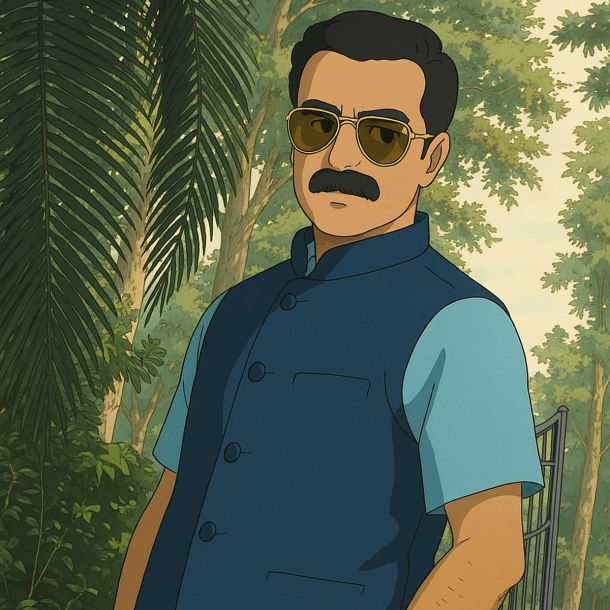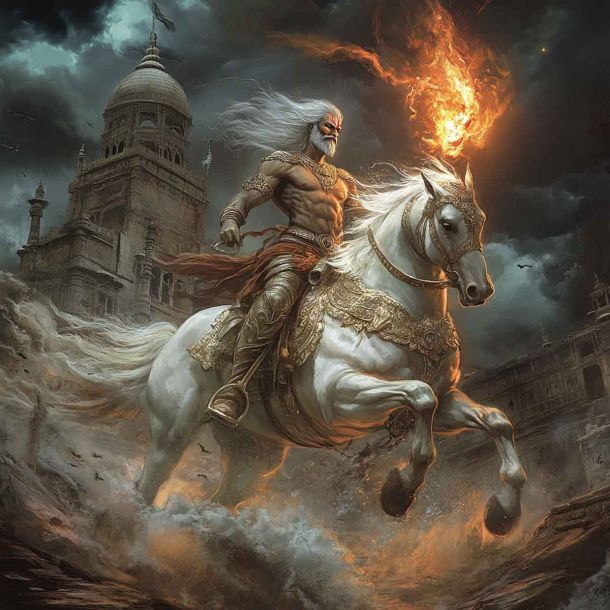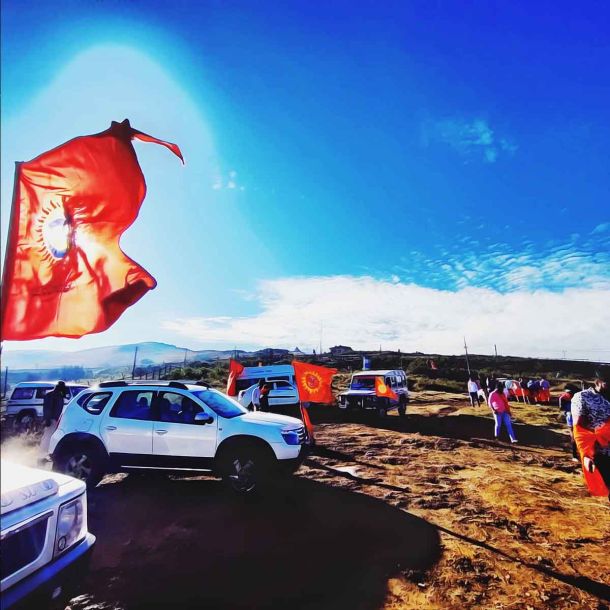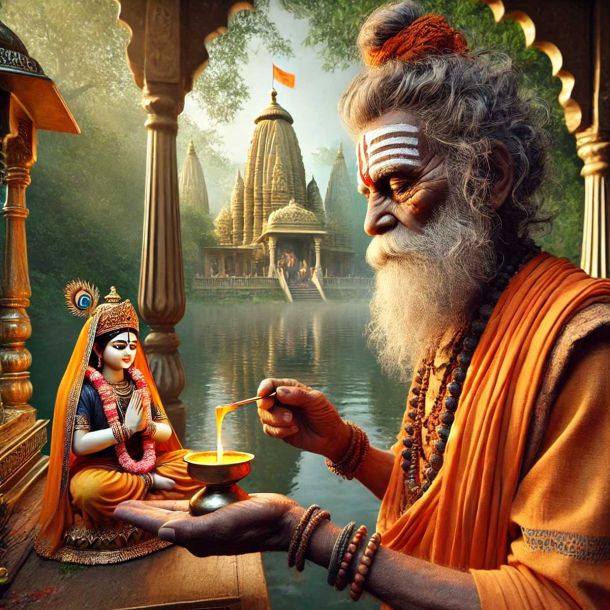More Coverage
Twitter Coverage
Satyaagrah
Written on
Satyaagrah
Written on
Satyaagrah
Written on
Satyaagrah
Written on
Satyaagrah
Written on
Join Satyaagrah Social Media
Lakshmi Narasimha Swamy Temple, Antarvedi, Andhra Pradesh
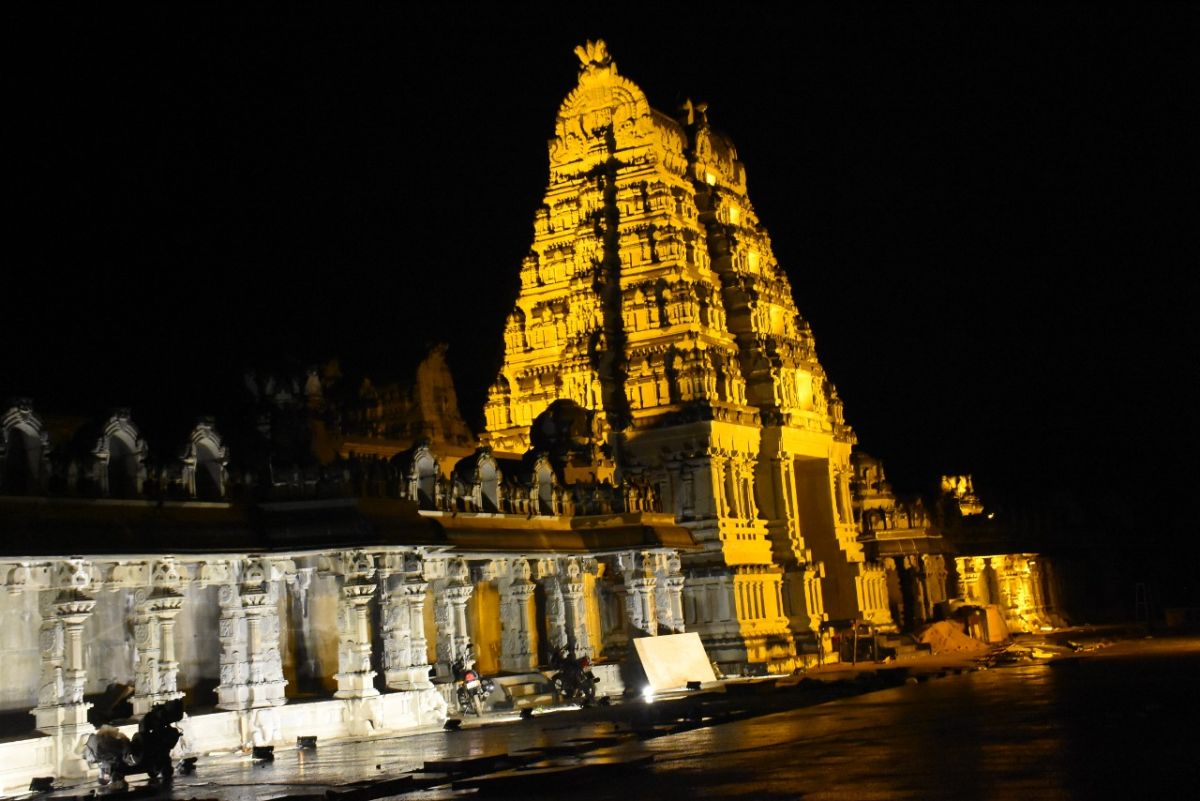
Antharvedi is located at a distance of 130 Kms from Kakinada, 100 kms from Rajahmundry and 65 Kms from Amalapuram. In Kritayuga, Sage Sounaka and his colleagues gathered in Naimisaranya to conduct Satrayaga. In the their Leisure time, they used to learn about the distinguished and significant historical India Shrines from Suta, a quaranic narrator. One day, they asked him to tell about the greatness and significance of Antarvedi Shrine and of Lord Lakshmi Narasimha. Suta was pleased to tell the story which was once told by Lord Brahma to Sage Narada.
Narration of Antharvedi Temple
Once Narada asked Lord Brahma to tell about the historical back-ground of the Antarvedi, Lord Brahma spoke as follows.
Sage Vasista, after mingling the Goutami branch of the Godavari into the Sea, established his Ashram there. Lord Brahma, to get freed from the sins he had committed against Lord Sankara, performed Rudrayaga and installed Lord Neela kantheswara there. As that place was made a stage or “Vedik” to perform the Yaga, it was named as “ANTARVEDI”. It is the place between the Vasishta river. After some time, Raktavilochana, the son of Hiranyaksha, did tremendous penance for ten thousand years on the banks of Vasishta river, to please Lord Siva and to get his grace. Lord sankara was very much pleased with his penance and appeared before him.
He promised to bless him with Whatever he would desire. Raktavilochana asked him that the number of sand particles drenched by the blood drops falling from his body on to the ground at war, would produce equal number of Rakshasas as strong and vigorous as himself after and they would assist him at war and become one with him after killing all the enemies. Lord Sankara was astonished at the demon’s uncommon desire, but as per the promise, being impressed of his penance had concerned to his desire. Then the rakshasas pride know no bounds. He started harassing the brahmins, the Gods, the saints and the cows and obstructed Yagas and Vedic-recitals.
Sage Viswamitra found opportunity to take Vengeance against sage Vasishta and provoke Rakta-vilochana to kill Vasishta’s hundred sons in his absence. The Demon did so, causing an irreparable loss to Arundhati and Vasishta. Arundhati, Vasishta’s wife, wept a lot for the death of her son and prayed to Vasishta who was then at Brahmaloka. The sage by his divine vision, could come to know of what all happened at this hermitage. He returned to his ashram and prayed for Lord Narasmiha’s grace.
“Prahlada varadam Vishnum Nrusimham Paradivatam. Saranam Sarvalokaanaamaapannaarti Nivaaranam.”
Then to save his devotees, Lord Nrusimha along with Goddess Lakshmi, Charioted on Garuda Vahana and appeared before Vasishta. Vasishta after singing his glory, appealed about the arrogance of the demon and his cruelty in killing his sons. He then prayed to the Lord to descend at his ashram, after killing the demon, so that he would worship him always.
Lord Narahari blow the ‘Panchajanya’ inviting the demon to the war. Raktavilochana heard the thundering noise of the panchajanya and like a cyclone enveloped the Lord and engulfed him to fight with him. He shot all types of weapons at the Lord. Lord Narahari could attack and smash them with his only weapon the ‘Sudarsana’ the chakrayudh wounded the sensitive parts of the demon’s body. As a result of which blood-shed took place. The soil particles drenched by the blood drops falling on to the ground from his body, produced equal number of demons as strong and vigorous as Raktavilochana. Demons having been thus generated, began hurting garuda who attached them in such a way that they could not with stand him. The demon-king saw this and throw his weapons one after another at Garuda which could not do any thing against him, as Lord Narahari destroyed them on the way with his Sudarana Chakrayudha.
In addition to that he created “Maya Sakthi” to manage stopping the fall of blood drops from Rakta Viliochana body to the ground. At last, after a tough fight with the demon, Lord Narahari killed by cutting his hand with chakrayudha, with the same Sudharsana chakra, he killed the demons also. Then the blood stopped by Maya Sakthi from falling on to the ground, was released by her as a reddish river, know as the “Raktakulya”. This river can’t be passed over even Bhetala and the devils. Maya sakti rode a horse, and so called as ‘Aswarudhamba’ or ‘Gurralakka’. The place where the Lord after killing the demons washed his chakrayudha, become popular as chakrateertham. A dip at the place washed away all the sins. When the Lord wiped of the troubling demon, Vasishta expressed his desire of establishing his Holiness at his hermitage. The Lord was pleased to agree to fulfill his desire. Sage vasishta on an auspicious day, in the Presence of all Gods and angels with all Vedic formalities, erected Lord Narahari at Antaravedi all of them said their prayers to the Lord and sang his glory. Then the Lord told them about the significant greatness of the shrine in future. He described Antarvedi in many ways as the easiest means for achieving the ultimate Mukti.
Later on, Suta, at the request of the sages, explained in detail about the sacred and splendid power of the Lord of Antarvedi, the affects of doing any harm to it and the remedy for it. He told them the story of Santhana as an illustration. Once Santhana by mistake lost his divinity and was cursed as unworthy to ascend the divinity. Indra’s sons used to take away all flower from a garden cultured by “Ruchi” at Antarvedi
Ruchi was much worried about this.Lord Narahari appeared to him in dream and advised him to keep the flowery remnants of worship of the temple around the garden. He did so on the next day. As usual, Indra’s son descended on to the earth in his chariot, he could not find them there, as he lost his divinity by passing over the flowery-remnants. Then his driver told him the cause for it. He at his master’s request, before returning to the Heaven, also advised him to perform Mahasatrayaga for twelve years and to eat the food left over after being tasted by the Brahmins. Indra’s son did so the Brahmins Learned from him about the purpose of doing so and blessed him. Then he regained his divinity and returned to the Heaven, ascending his divine chariot. Santhana was adivsed by Narada to follow Indra’s son also did so at Antarvedi and regained divinity.
For some time after commencement of Kaliyuga, Antervedi was a Jungle where kesavadas, a cow-herd used to graze his cows daily. A reddish brown cow of the herd to go lonely in the jungle and used to shed her milk on the hill behind a bush. On her returning home, Kesavadas was not given milk by the cow. One day he watchfully followed that cow and astonished to see the scene that was daily happening. He could not get sleep that night. At last when he could some how merge himself in to sleep, Lord Narahari appeared on him in dream and said to him to build a temple for him there. The next morning kesavadas told this to the Villagers. A brahmin scholar of the village, who had a sound knowledge of the sastras, could guess the God appeared to kesavadas in dream to be Lord Narasimha who was once erected and worshipped.
By the sage vasishta. The Villagers made a survey of the ant-hill area, where the cow daily used to shed her milk, and dug the area after offering coconuts to the Lord. They found a stony sculptured form of the Lord Narasimha. They build a temple there and that place become one of the most popular shrines in the later ages. The daily rituals and annual fair have been conducted since then. The village where kesavadas lived is named after him as ‘kesavadasupalem’.
After sometime the temple was ruined. The sri Narendra Lakshmi Narasimha Rao, wealthy generous gentleman of that area took initiative in re-erecting the temple. He donated some money and his men to Bhadrachalam to purchase timber for the construction of the temple. His men went to Bhadrachalam, selected the logs and marked them with the Lord’s name paying the money. But there was no conveyance to convey the timber then to Antarvedi, the water contents in the Godavari being low because of failure of monsoon. They appealed to Narasimha Rao about the situation. That gentleman did tapas in devotion of the Lord at the sea-shore without food continuously for three days, but the Lord didn’t shower his grace. So he got angry and standing in Sea water said that the Lord was destitute lion who could not come and see logs of wood even arranged for the construction of his temple. The same night there was heavy rain which brought all the logs of wood that were marked with the Lord’s name, to the gantaghat of Antarvedi. The sri Narasimha Rao ordered that all the wood could reach Gantaghat in a single leap. Later on, temple was ree rected by the notale initiative of Sri Narasimha Rao with the Villager’s cooperation. Again all the rituals were celebrated as usual.
After sometime, the temple was again ruined then some devotees were in plans of re-constructing the temple. One night Lord narahari appeared to a devotees of Lord who had two sons Ranganatha and Krishna residing at Bendamurulanka. The villagers, on hearing the devotees dream, approached a sri Adinarayana and sought his financial contribution. Adinarayana denied to help them as he was in a desperate need because of his missing seven of his ships.
Then his son Ranganatha said to him that some body appeared to him in dream and asked him to construct a temple as tower and canopy for him.So that they would be blessed with every you and wealth. Adinarayana was thrilled to hear his sons words and a canopy spending the whole money present in his seven ships, if they would be back to shore without any damage by the grace of the Lord on the third day all the seven ships returned to the shore without any loss. Adinarayana was pleased to hear the news and executed his oath. He ordered his sailors to get the required stone equipment for the construction of the temple, the tower and the canopy. On a auspicious day the foundation stone was laid on a first step for the reconstruction of the temple in 1923. The reconstruction work that initiated by Adinarayana, was completed by the combined effort of his sons Ranganatha and Krishna. This is historically evident from a stone inscription in the temple even today.
Some time later once a fisher man was fishing his net in the Raktakulya river. He found a marble saligrama instead of fish. He carelessly threw it back into the water and again spread his net. He found the same stone as many times as he was fishing at different spots in the river he found the same stone coming again to him. Being afraid of this incident, he angrily dashed it to the ground then there was a strange continuous blood flow from the stone with surprise and fear, he prayed the Lord and fell senseless there. The Lord appeared to him in dream and said that he only appeared in the waters of Raktakulya river as Kurmavatra in marble and asked him to take him to the temple and install him at the Abode of Lord Narasimha telling the priests as his works to celebrate the “Nityabhisheka” formalities to him along with Lord Narasimha there. The fisherman did so. This stony form Kurma incarnation of the Lord can be seen available even today at Antarvedi Devasthanam.
There are five important spots of this Holy shrine namely.
- The Sea
- The Sagar Sangam
- The Vasishta River
- The Raktakulya River
- The Chakrateertham
It is said that there will be no re-birth on taking a dip at these places and on offering charities there. Performing ceremonial formalities to the ancestors at this holy-shrine is equivalent to these done at Gaya and Ganges. One on nearly visiting this place, will be blessed from with multitudes. People from distant place, like Varanasi, also visit this place, especially to participate in Lord Narasimha’s Chariot procession in the month of Phalguna (January) and dolepournami celebration in the month of Phalguna (March). Then the lord is worshipped with panchamrita abhishekam. This shrine blesses the pilgrims with Mukti, and so it is also called the Mukti Kshetra. Antarvedi is also named after the Lord as ‘Narasimhakshetra’.
Antarvedi has the sea in the East and the South the Godavari in the West and the Raktakulya river the North. It covers a distance of about four square miles. It is in the Razole Tq. of the East Godavari District. Special conveyance facilities are arranged for the convenience of the pilgrims coming from distant place to attend the annual Mela there. At the time of Mela, Antarvedi seems to be kaliyuga Vaikuntha. The Mela run for about nine days. It is One hundred and eight shrines of Lord Narasimha.
Antarvedi is said to be the second Varanasi by the grace of the Lord. The residents of the shrine have a fear of the floods or of the drought. A more wish to visit this holy place, will bless the devotees with desired results. Thus the great glory of the shrine is boundless.
Festivals
- Kalyanamohasthavams Magh sudda Sapthami to Magha Bhhula Payamis
- Sri Swamy Vari Kalyanam (Magha Sudda Dasami)
- Rathayatra Magha Sudha Ekadasi
- Sri Venkateswara Swamy kalyanam, Jasta Sudha Ekadasi.
- Sri Narasimha Jayanthi (Vysakha Sudha Chaturdasi)
 Support Us
Support Us
Satyagraha was born from the heart of our land, with an undying aim to unveil the true essence of Bharat. It seeks to illuminate the hidden tales of our valiant freedom fighters and the rich chronicles that haven't yet sung their complete melody in the mainstream.
While platforms like NDTV and 'The Wire' effortlessly garner funds under the banner of safeguarding democracy, we at Satyagraha walk a different path. Our strength and resonance come from you. In this journey to weave a stronger Bharat, every little contribution amplifies our voice. Let's come together, contribute as you can, and champion the true spirit of our nation.
 |  |  |
| ICICI Bank of Satyaagrah | Razorpay Bank of Satyaagrah | PayPal Bank of Satyaagrah - For International Payments |
If all above doesn't work, then try the LINK below:
Please share the article on other platforms
DISCLAIMER: The author is solely responsible for the views expressed in this article. The author carries the responsibility for citing and/or licensing of images utilized within the text. The website also frequently uses non-commercial images for representational purposes only in line with the article. We are not responsible for the authenticity of such images. If some images have a copyright issue, we request the person/entity to contact us at satyaagrahindia@gmail.com and we will take the necessary actions to resolve the issue.
Related Articles
- Culture And Heritage - Meenakshi Temple Madurai
- Srikalahasti Temple, Dakshina Kailash
- Jagannath Temple administration issues clarification on proposed sale of temple lands
- Shri Murudeshwar Temple: Home To The World’s Second Tallest Shiva Statue
- Biggest Wonder of the World : Kitchen of Lord Shri Jagannath
- The forgotten temple village of Bharat: Maluti
- Sripuram Golden Temple: Interesting Facts about World’s Largest Golden Temple in India
- Yes, Secular India’s shift towards ‘Majoritarianism’ is very much real: So, just deal with it
- PM Narendra Modi inaugurated the Statue of Equality of Sri Ramanujacharya and emphasized 'Progressiveness does not mean detaching from one’s roots and that there is no conflict between progressiveness and antiquity.'
- Why Hindus not claiming their temples back from the Government control: Is pro-Hindu govt will always be in power
- Gita Press Gorakhpur – Bringing Sacred Hindu Texts to Every Hindu Home
- Mahakal Temple in Ujjain to get expanded complex with Rs 714 crore in such a way that there will be a feeling of grandeur and divinity: Another reason for devotees to celebrate after Kashi Vishwanath corridor
- An Artisan Heritage Crafts Village: Indigenous Sustainability of Raghurajpur
- A new symbol of Hindutva pride, Shri Kashi Vishwanath Temple Corridor
- Now Bharatwasi can see 3D visualization of Ram Mandir construction progress in detail through a video released by Shri Ram Janmabhoomi Teerth Kshetra Trust: Ayodhya
